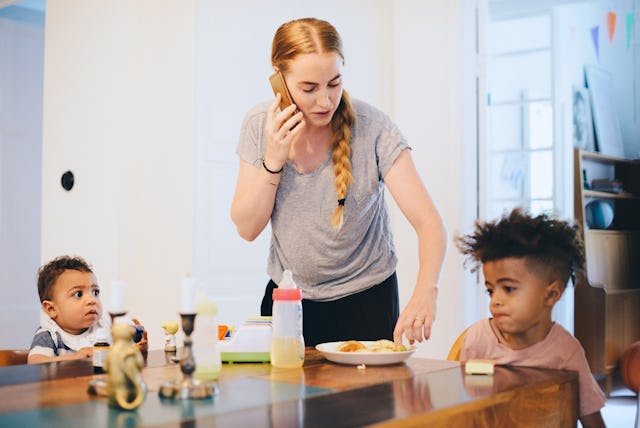Can We Please Stop Telling Other Moms "This Is The Easy Part"?
“There is no part of parenthood where we are not in the weeds,” says Sarah McCaslin, LCSW.

When my daughter was about a year old, my husband and I took her to the playground one sunny day. It was the summer of 2021, so COVID was still very much a part of everyone’s lives, and it was the only life I had known with my daughter.
I was just barely starting to feel like myself again, the slightest bit accustomed to the rigors of new motherhood. But I was still an exhausted, anxious mess. That day at the playground, I was really feeling it. And then, a few minutes later, I added two other emotions to the mix — red-hot anger, quickly followed by shame.
Nearby, a woman was playing with a slightly older child. Struggling to keep up with my on-the-move little lady, I pretty much broke down when the woman uttered the words that have since haunted me as a mom: “This is the easy stage!”
Wait... I’m losing my mind, and this is supposed to be Level 1?
Unsolicited comments like this (see also: “Just wait until she’s a teenager!” and “You’ll miss this when they’re older!”) can make us feel totally inadequate as mothers, says Sarah McCaslin, licensed clinical social worker and executive director of the Psychotherapy and Spirituality Institute in New York.
“In those moments, you feel invisible,” she says. “What we need is to be seen and be validated. The best that we can do for each other is just to acknowledge one another.”
It’s simple to equate our experience of motherhood with every other mom’s and to reminisce. And sure, there may be parts that some people find easier than others, but that’s where the ease ends. Every age brings its own challenges, and pitting them against each other is apples and oranges.
“There is no part of parenthood where we are not in the weeds,” McCaslin adds.
A Game with No Winners
Why do we feel the need to compete with other moms about who has it worse? It’s a way to externalize any shame we may feel about not living up to our own expectations of motherhood, McCaslin explains.
“When we find ourselves trying to ‘one up’ other mothers about how hard things are for us, we protect ourselves against the intolerable — but ultimately false — possibility that we are to blame,” she says, “that we are insufficient or incapable of parenting our own children.”
Support from others also in the trenches can help tamper down that voice. McCaslin recommends calling on the friends who make you think, “I don’t need to clean the house before they come over.”
The conversation may also be a disguised yearning for that oh-so-important acknowledgment McCaslin refers to: “We just need [somebody to say] ‘I see you and I get it,’” she says.
What’s Really Being Said
If you find yourself on the receiving end of one of those insensitive though probably well-intentioned “just you wait” comments, especially from a stranger, McCaslin says that chances are it’s not about you.
“A lot of it has to do with how we are feeling in any given moment,” she says. “The other person doesn’t know enough to make a comment on your parenting.”
For example, maybe that person is having their own struggles with their children. Or maybe that person is wistfully looking back and wondering if they enjoyed every moment with their little one “enough.”
So, perhaps that woman in the park was knee-deep in her own sh*t. When McCaslin senses an overwhelmed mom, she tries to send some empathy her way instead. Because parenting is the hardest job in the world, no matter how old our kids are. Let’s not make it any harder for each other.